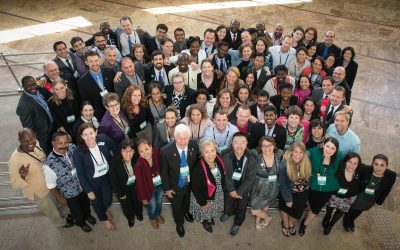In the run up to the festive season last year rains and winds of up to 70mph hit the North on a massive scale, with rivers bursting their banks, water levels reaching record heights, flood barriers breached and thousands of homes being flooded and left without electricity.
Homes were unliveable and businesses destroyed as rainfall hit a record high with flood defences unable to offer sufficient protection.
Over 5,000 homes suffered from water damage, leaving many homeless for Christmas Day and food shops in the area recording major stock damage.
To help families affected by the floods the government announced £50 million funding for those across Cumbria and Lancashire, with each family being able to claim up to £5,000 from their local authority as a contribution towards their losses.
Once the scale of the events was realised a relief fund was set up by the local Rotary clubs in the areas affected to help with the rehabilitation in the community. Rotarians and local people made donations to help assist with flood relief and Rotary set up a nationwide Donations Trust to help with the long-term community reconstruction.
It is not just donations that Rotary has provided. Rotarians across the country have put in countless man-hours helping to clean premises that have been damaged, as well as providing clothing and shelter – with some travelling miles across the country to lend a hand.
Wendy Aldred, representing clubs in North East Cumbria, watched the floods on television as she was visiting the Midlands and immediately saw fellow Rotarians spring into action, with calls of “what can we do to help?” An online meeting of Rotarians in the area was held to assess the damage, identify what was required and learn what clubs were doing.
Hearing the stories of those asking for donated items, and people embarrassed to be asking for this kind of help, was so sad.”
She explains: “In the Carlisle area, where I live, four clubs worked together to support the operation of the Joint Agency Emergency Evacuation Centre and then the Distribution Centres. The Distribution Centres were donated items including clothes, food, cleaning products, toys, bedding, toiletries and household items.
“Working with a team of volunteers from many organisations, a whole range of emotions was present. Hearing the stories of those asking for donated items, people with nothing, uninsurable houses, rented properties with no contents insurance, and people embarrassed to be asking for this kind of help, was so sad to hear.”
It isn’t the first time the areas have been hit by floods, with storms taking hold in 2005 and 2009, but the floods last year have been more widespread and damaging with Cumbria being worst hit.
Wendy continued: “North Cumbria has been through this twice before so some areas were able to react very quickly with previously agreed joint agency approaches supporting the flood relief efforts, then moving onto the recovery stage. Whilst lessons can always be learnt the approaches on the whole worked. What was very different in 2015 was the use of social media, a very useful tool in getting messages out.”
One Rotarian who has been affected by the floods both in 2005 and again recently was Belinda Artingstoll of the Rotary Club of Carlisle Castle, who after the floods 10 years ago thought she would be safe.
She told us: “After the flood defences were built in 2005 the last thing I was expecting was to get an automated severe flood warning message on my phone on the night of 5th December. Even then I really didn’t think it would happen to us again.
“Despite that I did take what I thought of as sensible precautions and moved my car to another street and moved as many of my belongings upstairs as possible. My car only just escaped, the street it was in flooded at one end but luckily my car was at the other.”
Belinda was away in 2005 and had not experienced the floods first hand, she went on to explain: “I managed to stay calm throughout, the power went off mid-morning on the 6th December, and up until that point I was still online getting support of fellow Rotarians and friends.
“At 4pm we left our home by boat, as we didn’t fancy spending the night without food, heat and a working toilet. The emergency services were amazing throughout, the mountain rescue team who brought me out were very funny and joked: “Just because it looks like Venice, don’t think we’re going to be singing like they do on the gondolas.” There was a great sense of local spirit.”
Since the floods, Belinda has been inundated with support from Rotarians, with two allowing her to stay with them while waiting for temporary accommodation. Others have offered storage space, spare furniture and gifts of baked goods to lift her spirits.
She comments: “In 2005 I wasn’t a Rotarian, but this time it has provided me with a real boost. It’s not just Rotarians who have been fantastic but also acts of kindness like the church ladies standing in the freezing cold to serve us hot drinks, the Muslim guys from Lancashire who came to help, and the young farmers who put out sandbags.”
She concluded: “I expect to be out of my house for up to a year but again, having been flooded before, I know what to expect and that does make it easier. Of course there will be frustrations along the way but there are people a lot worse off than me and so I am always looking for the silver lining.”
Over in Kendal, the River Kent has a reputation of rising very quickly when there is significant rain in the hills, but usually the fields to the north of the town carry the overflow water. An online riverside camera showed that the levels were rising to a dangerous height and soon the flood warnings were issued.
The waters began to hit the town like a tidal wave, with residents given very little time to evacuate and in total 2,700 properties were swamped with water. The worst flood previously on record in the town was 1898, but this was exceeded by 75cm in December 2015.
As with many communities, there was a magnificent support effort.
People were amazingly generous and many told us that they trusted Rotary to make sure the money they were giving was being well used.”
Members of The Rotary Club of Kendal attended the flood relief centres and assisted where possible. The two clubs, Kendal and Kendal South Westmorland, went out on the streets to collect and took £7,000 in one day followed by many more generous donations.
Tim Keegan, of the Rotary Club of Kendal, commented: “In total we raised over £17,000. The bulk of this was passed to Cumbria’s Community Foundation, mostly ring-fenced for Kendal and the immediate area. Kendal may have appeared in the media with Appleby, Carlisle, Cockermouth and Glenridding, but we must not forget the smaller communities near us, which were badly affected.
“We were also able to give to the Kendal Food Bank. They were blessed with great generosity from Kendalians and further afield. People were amazingly generous and many told us that they trusted Rotary to make sure the money they were giving was being well used.”
Arthur Jones, responsible for clubs over Lancashire and Cumbria area, knows only too well how devastating the damage can be and how Rotary once again has played a significant role in support for those hit.
Arthur commented: “The relief work is a multi-agency approach with Rotary playing an important role of providing man power to help run reception centres and distribution centres in the affected areas. We have two Rotary Resilience Officers in our district, one per county, and I thank them for their hard work in liaising with other agencies to achieve an effective working relationship and to ensure appropriate responses.
“I would also wish to say a huge thank you to all clubs in the local area for their immediate offers to help and the response from across the country is amazing and shows why Rotary is so effective offering a true example of ‘Service Above Self’.”
The rain and winds in northern England and Scotland persisted well after the holiday period and more cities and towns were flooded, including Yorkshire with the city of York and the Calder Valley succumbed to extensive flooding. Rotarians once again were out and about helping the emergency services and were very much ‘hands on’.
The Rotary clubs covering the area have raised over £20,000, which will be match funded by the government and used for longer term projects helping communities in York and the Calder Valley get back on their feet.
One aspect of the relief effort that locals found encouraging was the help from the Muslim communities in Leeds, Bradford and Stoke-on-Trent who travelled to bring soup and food to those who suffered and the aid workers. They also offered a much needed and welcome helping hand in cleaning up.
Rotarians are renowned for their can do attitude, reacting to disasters and tragic events all over the world, not only with donations of money but also on the ground help. When disaster hits closer to home the Rotary action is just as effective with Rotarians taking action for their community.


























































